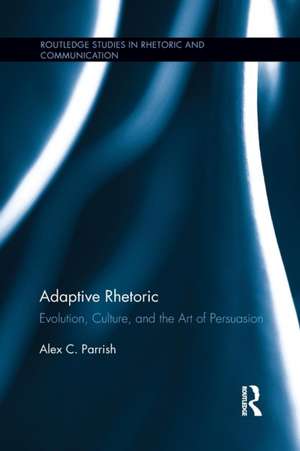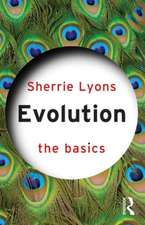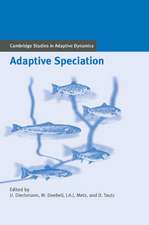Adaptive Rhetoric: Evolution, Culture, and the Art of Persuasion: Routledge Studies in Rhetoric and Communication
Autor Alex C. Parrishen Limba Engleză Paperback – 3 sep 2015
| Toate formatele și edițiile | Preț | Express |
|---|---|---|
| Paperback (1) | 408.16 lei 43-57 zile | |
| Taylor & Francis – 3 sep 2015 | 408.16 lei 43-57 zile | |
| Hardback (1) | 1057.05 lei 43-57 zile | |
| Taylor & Francis – 2 dec 2013 | 1057.05 lei 43-57 zile |
Din seria Routledge Studies in Rhetoric and Communication
-
 Preț: 386.42 lei
Preț: 386.42 lei -
 Preț: 354.95 lei
Preț: 354.95 lei - 18%
 Preț: 1001.07 lei
Preț: 1001.07 lei -
 Preț: 462.63 lei
Preț: 462.63 lei - 12%
 Preț: 312.43 lei
Preț: 312.43 lei -
 Preț: 389.38 lei
Preț: 389.38 lei -
 Preț: 309.69 lei
Preț: 309.69 lei - 20%
 Preț: 373.53 lei
Preț: 373.53 lei -
 Preț: 465.49 lei
Preț: 465.49 lei - 18%
 Preț: 997.90 lei
Preț: 997.90 lei -
 Preț: 388.16 lei
Preț: 388.16 lei -
 Preț: 363.00 lei
Preț: 363.00 lei - 18%
 Preț: 1218.12 lei
Preț: 1218.12 lei - 18%
 Preț: 1060.87 lei
Preț: 1060.87 lei - 18%
 Preț: 1106.02 lei
Preț: 1106.02 lei - 18%
 Preț: 1113.12 lei
Preț: 1113.12 lei -
 Preț: 317.48 lei
Preț: 317.48 lei -
 Preț: 436.14 lei
Preț: 436.14 lei - 18%
 Preț: 1004.20 lei
Preț: 1004.20 lei -
 Preț: 411.42 lei
Preț: 411.42 lei -
 Preț: 449.41 lei
Preț: 449.41 lei - 18%
 Preț: 1116.38 lei
Preț: 1116.38 lei - 15%
 Preț: 421.44 lei
Preț: 421.44 lei - 18%
 Preț: 1162.84 lei
Preț: 1162.84 lei - 18%
 Preț: 1166.68 lei
Preț: 1166.68 lei - 18%
 Preț: 1059.14 lei
Preț: 1059.14 lei - 26%
 Preț: 875.55 lei
Preț: 875.55 lei - 34%
 Preț: 184.00 lei
Preț: 184.00 lei - 18%
 Preț: 1109.99 lei
Preț: 1109.99 lei - 18%
 Preț: 1053.16 lei
Preț: 1053.16 lei - 18%
 Preț: 1057.05 lei
Preț: 1057.05 lei - 18%
 Preț: 1330.34 lei
Preț: 1330.34 lei - 30%
 Preț: 849.29 lei
Preț: 849.29 lei -
 Preț: 462.63 lei
Preț: 462.63 lei - 18%
 Preț: 1218.08 lei
Preț: 1218.08 lei - 18%
 Preț: 1056.71 lei
Preț: 1056.71 lei - 18%
 Preț: 1056.35 lei
Preț: 1056.35 lei
Preț: 408.16 lei
Nou
Puncte Express: 612
Preț estimativ în valută:
78.10€ • 81.76$ • 64.62£
78.10€ • 81.76$ • 64.62£
Carte tipărită la comandă
Livrare economică 07-21 aprilie
Preluare comenzi: 021 569.72.76
Specificații
ISBN-13: 9781138954168
ISBN-10: 1138954160
Pagini: 182
Dimensiuni: 152 x 229 x 10 mm
Greutate: 0.26 kg
Ediția:1
Editura: Taylor & Francis
Colecția Routledge
Seria Routledge Studies in Rhetoric and Communication
Locul publicării:Oxford, United Kingdom
ISBN-10: 1138954160
Pagini: 182
Dimensiuni: 152 x 229 x 10 mm
Greutate: 0.26 kg
Ediția:1
Editura: Taylor & Francis
Colecția Routledge
Seria Routledge Studies in Rhetoric and Communication
Locul publicării:Oxford, United Kingdom
Public țintă
Postgraduate and UndergraduateCuprins
Introduction Part I 1. Classical Naturalism 2. Nature, Nurture, and Negativity: Wilson’s Consilience and the Art of Rhetoric 3. Is it Adaptive? Is it Rhetoric? Part II 4. Animal Signaling and the Art of Persuasion 5. Deception, Mimicry, and Camoflage 6. Rhetoric and Theory of Mind 7. Evolutionary Memoria: Grounded Cognition and the Fourth Canon Conclusion: The Significance of an Interdisciplinary Approach
Notă biografică
Alex C. Parrish is Assistant Professor of Writing, Rhetoric, and Technical Communication at James Madison University, USA.
Recenzii
"In this well-researched, cross-species study, Parrish employs a biocultural paradigm when tracing the origins of rhetoric. He reveals the artifacts of humans' communicative past via the lens of animal signaling, uncovering how animals exercise persuasive tactics in order to overcome difficulties that are similar to human problems ... No other book examines rhetoric from this perspective in such a thorough way."
- K L. Majocha, University of Pittsburgh at Johnstown, in CHOICE
"Parrish's book is important. It brings together a wide range of findings in the sciences and humanities; it endorses a much broader conception of communication that extends beyond animals, akin to ongoing inquiries in biosemiotics; and, most centrally, it expands rhetoric beyond the confines of the human."
- Ryan Hediger, Kent State University at Tuscarawas, in Interdisciplinary Studies in Literature and Environment
- K L. Majocha, University of Pittsburgh at Johnstown, in CHOICE
"Parrish's book is important. It brings together a wide range of findings in the sciences and humanities; it endorses a much broader conception of communication that extends beyond animals, akin to ongoing inquiries in biosemiotics; and, most centrally, it expands rhetoric beyond the confines of the human."
- Ryan Hediger, Kent State University at Tuscarawas, in Interdisciplinary Studies in Literature and Environment
Descriere
Rhetorical scholarship has for decades relied solely on culture to explain persuasive behavior. While this focus allows for deep explorations of historical circumstance, it neglects the powerful effects of biology on rhetorical behavior – how our bodies and brains help shape and constrain rhetorical acts. By introducing evolutionary biology into the study of rhetoric, this book serves as a model of a biocultural paradigm. This cross-species study of rhetoric allows us to trace the origins of our own persuasive behaviors, providing us with a deeper history of rhetoric that transcends the written and the televised, and reveals the artifacts of our communicative past.











